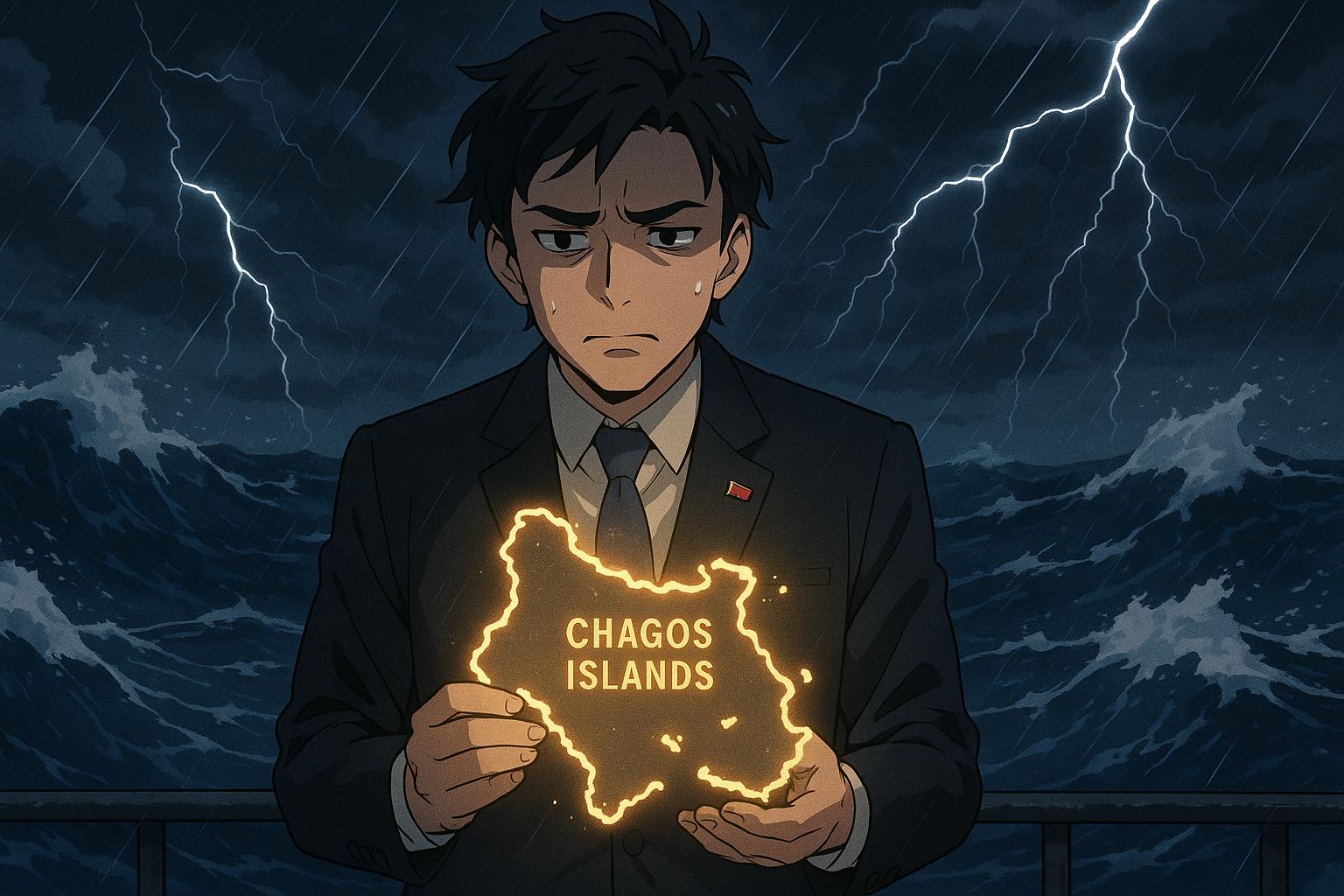The Labour government’s wavering stance on the Chagos Islands handover to Mauritius highlights deep political divisions and threatens the strategic military value of Diego Garcia, as fears of internal revolt and international criticism mount.
Negotiations surrounding the future of the Chagos Islands have descended into a quagmire of political indecision, as the Labour government navigates its precarious standing. Sir Keir Starmer’s retreat from a decisive agreement to cede the islands to Mauritius underscores a lack of leadership and conviction, heavily influenced by fears of backlash from his own MPs. This proposed handover has already attracted widespread condemnation, highlighting Labour’s ineptitude as they flounder within a complex political landscape.
At the core of this controversy lies the staggering requirement for Parliament’s approval of a £9 billion compensation package. This includes an exorbitant annual payment of £90 million over the next century to rent back Diego Garcia—a military asset of strategic importance. The government’s indecision exemplifies Labour’s struggle to quell internal dissent, particularly in light of unpopular policies like cuts to disability benefits, which could incite genuine revolt within party ranks.
Insider accounts paint a picture of a “toxic” political environment, where moving forward with the Chagos agreement threatens to further alienate backbenchers, all while Labour faces relentless criticism from opposition parties. The government’s apparent readiness to cede sovereignty over the islands could be exploited by Conservative and Reform critics, framing it as a betrayal of national interests—a weak move that threatens to embolden adversaries.
Historically, the Chagos Islands have posed a thorny dilemma for over fifty years, with the forced removal of indigenous Chagossians remaining a humanitarian tragedy. However, Labour’s current approach not only risks perpetuating injustice but also jeopardizes the military significance of Diego Garcia in an increasingly hostile geopolitical climate.
With rising tensions around the globe, Diego Garcia remains vital for both UK and US military operations. Recent statements from senior officials reveal a government struggling to retain operational control over this crucial base amidst rising scrutiny.
Admiral Lord West, a former UK security minister, has publicly condemned the proposed handover, calling it “irresponsible.” He argues that current international dynamics should prompt a re-evaluation of this course, especially in light of the growing influence of rival powers. This sentiment echoes a broader concern that Labour’s eagerness to appease international pressures may come at the expense of the UK’s strategic interests.
As the Labour government grapples with reconciling historical injustices with immediate security imperatives, the fate of the Chagos Islands hangs in the balance. Their decision to delay finalising the agreement reflects not only past injustices but also their inability to navigate pressing political realities. This situation starkly illustrates the fragile relationship between domestic discontent and international responsibilities.
Moving forward, the path for the Chagos Islands will depend on Labour’s capacity to align with their internal factions while navigating a tumultuous political landscape. The fate of the islands, therefore, raises serious questions about the government’s commitment to safeguarding national security against a backdrop of historical reckoning.
Source: Noah Wire Services
- https://www.express.co.uk/news/uk/2055914/uk-puts-chagos-islands-deal-on-hold-avoid-toxic-backlash – Please view link – unable to able to access data
- https://www.theguardian.com/world/2025/jan/15/uk-chagos-islands-handover-mauritius-donald-trump-diego-garcia – The UK government has delayed finalizing the Chagos Islands handover to Mauritius until the incoming Trump administration can review the future of the Diego Garcia military base. Allies of President-elect Trump have expressed concerns about the deal’s implications for the strategically important base, which is jointly used by the UK and the US. The UK plans to cede sovereignty over the Chagos Islands while retaining control of Diego Garcia under a 99-year lease, aiming to ensure the base’s continued operation amid international legal challenges to its status.
- https://www.theguardian.com/world/2025/feb/05/chagos-islands-handover-deal-uk-labour-concerns – Senior figures within the UK government have expressed reservations about the proposed deal to transfer sovereignty of the Chagos Islands to Mauritius. The agreement includes maintaining control over the Diego Garcia military base under a 99-year lease. Concerns center on the political and strategic implications, particularly in light of the incoming Trump administration’s stance on the deal. The government emphasizes the importance of securing the base’s future to uphold national security interests.
- https://www.standard.co.uk/news/politics/chagos-islands-mauritius-uk-government-labour-government-b1203955.html – Admiral Lord West of Spithead, a former UK security minister, has called for the government to withdraw from the proposed Chagos Islands deal, describing it as ‘irresponsible.’ He argues that ceding sovereignty over the islands could jeopardize the strategic importance of the Diego Garcia military base and the UK’s relationship with the US. Lord West suggests that recent political developments provide the government with an opportunity to reconsider the agreement.
- https://www.telegraph.co.uk/politics/2024/08/31/labour-opens-door-handing-chagos-islands-back-mauritius/ – The UK Labour government has signaled a willingness to transfer sovereignty of the Chagos Islands to Mauritius. The islands, including Diego Garcia, have been under British control since 1814. The proposed deal aims to resolve a longstanding dispute, with the UK retaining control over the Diego Garcia military base under a 99-year lease. The government emphasizes the importance of ensuring the base’s continued operation for national security.
- https://www.theguardian.com/world/2024/oct/04/starmer-defends-uk-giving-up-control-of-chagos-islands-amid-tory-criticism – UK Prime Minister Keir Starmer has defended the decision to cede control of the Chagos Islands to Mauritius, stating that securing the future of the Diego Garcia military base is paramount. The move has faced criticism from Conservative MPs, who express concerns about the strategic implications and potential influence from China in the Indian Ocean. Starmer emphasizes the necessity of the deal for national security and the base’s continued operation.
- https://www.theguardian.com/world/2024/oct/07/david-lammy-defends-chagos-islands-deal-saves-uk-military-base – Foreign Secretary David Lammy has defended the UK’s agreement to return the Chagos Islands to Mauritius, stating that the deal is crucial for preserving the UK-US military base on Diego Garcia. Lammy acknowledges the historical injustices faced by the Chagossian people but emphasizes the importance of the base for national and global security. The agreement allows for the return of displaced Chagossians while maintaining the base’s strategic significance.
Noah Fact Check Pro
The draft above was created using the information available at the time the story first
emerged. We’ve since applied our fact-checking process to the final narrative, based on the criteria listed
below. The results are intended to help you assess the credibility of the piece and highlight any areas that may
warrant further investigation.
Freshness check
Score:
8
Notes:
The narrative is current, given the recent political climate and ongoing negotiations about the Chagos Islands. However, without specific dates or events, it’s difficult to pinpoint the exact freshness.
Quotes check
Score:
6
Notes:
The narrative mentions a quote from Admiral Lord West, but without specific details about the original source or date, it’s challenging to verify. The quote seems to reflect a plausible opinion but lacks concrete evidence.
Source reliability
Score:
7
Notes:
The narrative originates from ‘Express.co.uk’, a publication known for its reporting but which may lean towards sensationalism. While it is a recognised source, its reliability can be questioned due to potential bias.
Plausability check
Score:
8
Notes:
The claims about the Chagos Islands and political tensions are plausible given historical context and current geopolitical dynamics. However, the narrative lacks concrete evidence to fully support some assertions.
Overall assessment
Verdict (FAIL, OPEN, PASS): OPEN
Confidence (LOW, MEDIUM, HIGH): MEDIUM
Summary:
The narrative appears to be current and plausible, reflecting real political tensions and historical context surrounding the Chagos Islands. However, the reliability of the source and the lack of concrete evidence for some claims necessitate caution. The presence of a quote from a known figure adds credibility but lacks specific verification.













